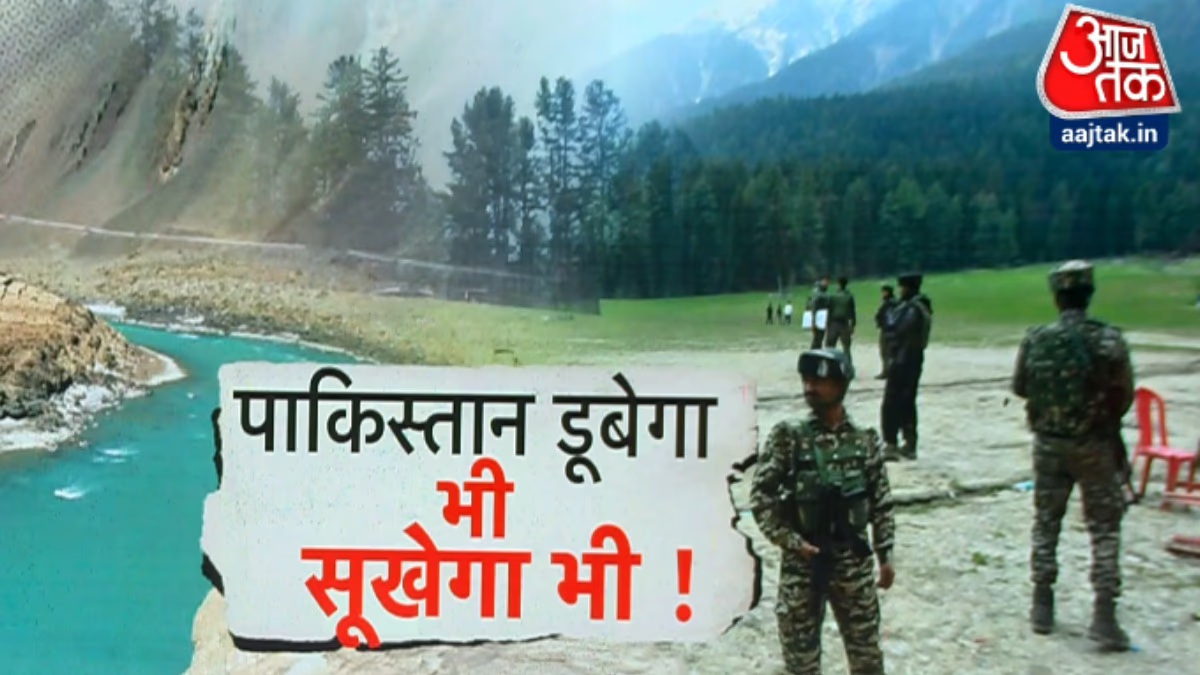The terrorist attack on April 22 in Pahalgam, Jammu and Kashmir, has given India a reason to unleash its multifaceted response on Pakistan. India is set to strike Pakistan with intense pressure, ensuring it remains fearful until significant change is seen.
Strategic Deliberations
Meetings in India continue as strategies are being crafted at every level to teach Pakistan a lesson.
Military Authorization
The Indian government has sanctioned the military for open action against Pakistan.
Air and Sea Frontiers Secured
Pakistani flights can no longer traverse Indian airspace. A firm grip on the seas further loops Pakistan's actions. There’s ongoing movement at the borders.
The Indus Treaty Blow
The Indus Treaty poses the most significant hit to Pakistan. The visuals alone are enough to escalate its concerns.
Flood-Like Conditions
Due to heavy rains, water discharged from the Salal Dam in Jammu and Kashmir has led to flood-like conditions in Pakistan. With the Chenab River flowing 5 to 7 feet above normal levels post-rain in Jammu and Kashmir, flood warnings stir throughout lower regions in PoK like Surakpur, Headmarala, Uri, Marikarohra, Bahalapur, and Gangwal.
The Rising Jhelum
Simultaneously, the Jhelum River surges, striking PoK with palpable fear as it swells 8 to 10 feet overnight, leaving dread among the people of Muzaffarabad.
Local Distress
Even a glimpse of India’s plan has unsettled PoK. Water released from the Jhelum now exacerbates residents' hardships. A local fisherman recounted, “I tried crossing the river to sell my catch, just enough to get by. Last week, my nets were lost in the 10-foot wave surge, leaving heavy losses.”
Impact on the Terror Hubs
The regions harboring terrorist camps, conspiring to kill innocents, face severe blows from India’s Indus strategies. Even former leaders in PoK now call upon laws for protection.
Pakistan's Legal Appeal
They argue this is not merely a bilateral issue but also involves the World Bank. No side should deviate (India or Pakistan) unless agreed upon mutually.
Indus Treaty’s Intimidation
The highest unease in Pakistan is linked to the Indus Treaty, knowing its lifeline lies with India. Control over the rivers could bring Pakistan to a standstill.
Pakistan’s Threats
Pondering these actions as more threatening than war, Pakistan propagates threats on television. Its defense minister states that stopping this water will be perceived as an act of war, potentially resulting in defensive measures from Pakistan.
Water Blockade Leading to Conflict?
Any attempt to structure barriers could provoke Pakistan to launch attacks, equivalent to initiating war, according to them.
Pakistan’s Dilemma
Already lacking drinking water, facing scarcity, it plans to halt Indus projects, interpreting this as warfare.
Farooq Abdullah’s Opinion
Former Jammu and Kashmir Chief Minister Farooq Abdullah emphasizes that this is the opportune moment to dissolve the Indus Treaty. India’s entitlement to its water surpasses Pakistan’s. We've long advocated revisiting the treaty, lest the damage be self-inflicted. After all, it’s our rivers; we need the water. We propose closing off their supply.
Jammu and Kashmir’s Thirst
Today (Saturday), the most pressing need in Jammu is water. While efforts were previously made to channel Chenab's water away from them, now is the perfect time to direct it back for Jammu's benefit. We deserve this water just as much, if not more than they do.
Deep Indus Wound, Pakistan’s Agitation
The water-induced wound runs deep for Pakistan, as seen from India’s announcement to terminate the Indus Treaty. Its panic echoes the looming floods and famine.
End of Terrain for Terrorists
Even the scant remaining land for terrorists sways under India’s power. In contemplating attacks on Pakistan, it must remember any intrusion on the Indus could flood homes, not just lands.
Non-Violent Strikes
India hasn’t wielded weapons, yet Pakistan’s unease is striking. India fires no shots, but Pakistan is already wounded.
Even before retaliation by India, Pakistan senses impending doom from a singular action—the annulment of the Indus Water Treaty.
India’s Agricultural Revival
This decision largely impacts the 240 million dependent on the Indus, stretching hope across Punjab, Haryana, and Rajasthan's desert regions. Praise flows for India’s plan to withhold waters from Pakistan, instead redirecting it to Rajasthan's border territories.
Implementation of the Indus Project
India has structured a plan to halt the Indus River’s flow, proposing new dam constructions, enhancing existing capacities, forming reservoirs, and clearing silt.
Diplomatic Offense
India has embarked on diplomatic measures post-Pahalgam attack, presenting a strong diplomatic offensive. Pakistan receives a clear message: India will no longer tolerate terrorism.
Pakistan’s Heightened Concern
This treaty’s dissolution from 1960 has elevated Pakistan's anxiety. With 80% of its agriculture reliant on the Indus and 25% of its irrigation dependent, the livelihoods of 200 million rest in its flow.
Cities like Karachi, Lahore, and Multan rely on it for drinking water. Crossing the India-Pakistan border, it enters Pakistan. The time nears when its flow halts, altering its course or expanding storage.
An India Strike, Pakistan’s Panic
This stringent measure from India confirms harsh realities for Pakistan—all depending on the Indus water’s cessation.




